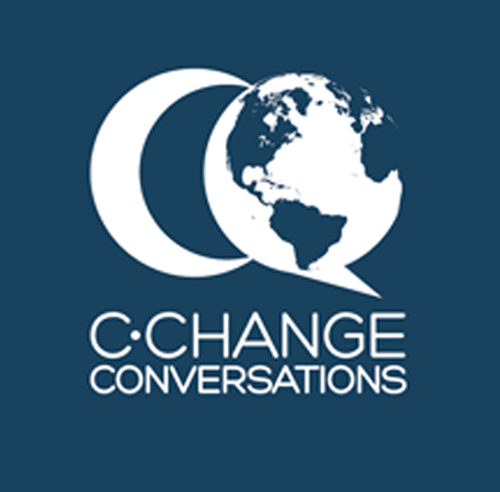It is difficult when family members disagree, but C-Change offers a way to find common ground. Recently we were honored to be invited to address the now politically-divisive issue of climate change by the Women’s Alliance of Central Unitarian Church in Paramus, New Jersey as part of their fifth annual Speakers Series. The following is an adaptation of a sermon written and delivered by Katy Kinsolving, a C-Change founding member, on Sunday, October 24, 2021.
Finding Common Ground
By Katy Kinsolving
My brother-in-law is a complex and interesting man. By cultural media standards, we are on extreme opposite sides of the political divide. He wears his “Make America Great Again” hat with pride, rides a Harley, and coached his sons’ football teams for years. I drive an electric car and serve on the environmental commission in my town. Listening to the pundits, I should be shaking my fist in my brother-in-law’s face.
And yet.
I know him to be a good and loving husband. He has a wicked sense of humor, a wonderful imagination and was an excellent son-in-law to our late mother-in-law. We share a love of gardening and birds. Sometimes he’ll send me a text describing a bird he’s seen and ask if I know what it is. He reaches out, and I am touched. We look for common ground, even though that can be particularly challenging when talking about climate change.
It’s been a polarizing topic for over a decade now, but it wasn’t always this way. George W. Bush was elected on a Cap-and-Trade platform. Here’s a video of Nancy Pelosi and Newt Gingrich seated together, talking about how Americans must act together on this topic. The issue was on both parties’ platforms in the 2008 election. Unfortunately, after Al Gore won the Nobel Peace Prize for his climate change movie, “An Inconvenient Truth,” the issue began to be seen as a liberal one, and we had a new litmus test of what makes one a good conservative or liberal and a new issue to divide us.
While the recent onslaught of weird and extreme weather, flooding, and horrendous fires has helped bring the issue front and center, most of us are still working on finding a framework for speaking about climate change without hostility and rancor. The C-Change Primer provides this framework. It has been presented in more than 31 states primarily to conservative and moderate communities, including in the Deep South and Midwest. We have many testimonials from audience members describing how the presentation changed their minds and opened their hearts.
But what about the small, informal opportunities to have a conversation about our changing climate? During a recent sermon on this topic, I chose the reading from St. Paul’s Letter to the Corinthians because we must begin with love for all our fellow humans, regardless of our politics. In our work to save humanity from the predicted ravages of climate change, we need to follow the teaching that “Love is patient, love is kind. Love is not envious or boastful or arrogant or rude. It does not insist on its own way; it is not irritable or resentful”.
The New Yorker recently profiled evangelical Christian and atmospheric scientist Katharine Hayhoe, who lives in Texas and is a sought-after speaker on climate change. She loves her fellow humans enough to discard the term climate change when she is talking to cotton farmers in West Texas; she talks instead about “long-term trends” and “weather variability.” In the article, Hayhoe says, “If there’s a problem and we’re not going to fix it, then that makes us bad people. No one wants to be a bad person”.
This is how we start, with love and the notion that no one wants to be a bad person. We need to celebrate diverse interests, as incomprehensible as they may seem. We know from studying the natural world that where there is biodiversity, there is strength and resilience. Human diversity − in all its forms − is no different; it enriches the fabric of society.
We can express love for others by listening to them without rancor or dismissiveness and without trying to overwhelm people with arguments and statistics. We need to eschew the behavior of pundits and politicians; their aim–with their sound bites and angry tweets–is to get attention, to engage and enrage us.
And, as Johnny Mercer wrote, we need to “Ac-Cent-Tchu-Ate the Positive” and be optimistic and forward-looking, speaking of progress being made, human ingenuity, scientific discovery, and economic opportunity.
Instead of bashing people on the head with dire predictions, we need to let them in on some of the solutions at hand. Instead of saying flying is BAD, we need to talk about the best ways to offset carbon emission from flights. Let’s convey excitement about regenerative agricultural methods, carbon capture technology, and the explosive growth in renewable energy jobs.
Sometimes, instead of talking, we need to act. Being a climate action leader doesn’t always mean attending marches and making speeches. It could be as simple as changing out all the lightbulbs in our houses for LEDs. There was an 11.5% decline in electricity use in American homes from 2010 to 2017 almost entirely due to ongoing transformation of the humble lightbulb from incandescent to LEDs. LEDs use 80% less energy … which leads to lower energy bills.
We can lead by:
- committing to eat more plant-based food, by eating local, by taking public transportation, and by composting our food waste.
- replacing one ancient energy-sucking appliance with an energy-efficient one.
- working with our local planning board to think through what land use and zoning rules will help our communities to be climate resilient.
- advocating for climate-smart policies on stormwater management in our towns, our counties, and our states.
- planting trees–or better yet, planting two and asking two friends to plant trees.
- donating to non-profits that are working in this space. There are scientific research organizations across America working to figure out solutions; they need our financial support.
Leading with actions like these matters because we humans are social creatures. We look to each other for clues on how to act. Let your friends and family know why you are getting an electric car or buying carbon offsets when you fly. Your example can inspire others.
And if people should say to you, “Why should we Americans do all this when China and Russia are still burning coal?” say this: That is what Americans do; we lead. We have always led in scientific innovation, industry, policy, and philanthropy. Now is the moment to re-secure that mantle of leadership, to forge new alliances, to work together … for the love of humanity. Let’s find common ground.
Katy Kinsolving is a founding member of C-Change Conversations. Currently, she works in administration at Cary Institute of Ecosystem Studies. She is also a food educator and writer with a background in non-profit management, public relations, and special events. Katy is co-author of “Essential Flavors” and writes the “Good Food Naturally” blog. When she lived in Princeton, she served on the board of The Watershed Institute. This blog was abridged and adapted from a sermon she delivered to the congregation of the Central Unitarian Church in Paramus, New Jersey in October 2021.


